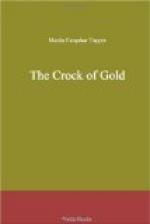“Come along, Mynton; Hunt, now mind you try and lame that big beast of a raw-boned charger among these gutters, will you? I’m off, Jennings; meet me, do you hear, at the Croft to-mor—”
So the three friends galloped away; and John Vincent really felt more light-hearted and happy than at any time the week past, for having so properly got rid of a welcome bit of gold.
“Roger Acton! come up here, sir, out of that ditch: his honour has been liberal enough to give you a shilling to drink his health with.”
“A shilling, Muster Jennings?” said the poor astonished man; “why I’ll make oath it was a pound; I saw it myself. Come, Muster Jennings, don’t break jokes upon a poor man’s back.”
“Jokes, Acton? sticks, sir, if you say another word: take John Vincent’s shilling.”
“Oh, sir!” cried Roger, quite unmanned at this most cruel disappointment; “be merciful—be generous—give me my gold, my own bit of gold! I’ll swear his honour gave it for me: blessings on his head! You know he did, Mr. Simon; don’t play upon me!”
“Play upon you?—generous—your gold—what is it you mean, man? We’ll have no madmen about us, I can tell you; take the shilling, or else—”
“’Rob not the poor, because he is poor, for the Lord shall plead his cause,’” was the solemn answer.
“Roger Acton!”—the bailiff gave a scared start, as usual, and, recovering himself, looked both white and stern: “you have dared to quote the Bible against me: deeply shall you rue it. Begone, man! your work on this estate is at an end.”
CHAPTER VII.
Wrongs and ruin.
A very miserable man was Roger Acton now, for this last trial was the worst of all. The vapours of his discontent had almost passed away—that bright pernicious dream was being rapidly forgotten—the morning’s ill-got coin, “thank the Lord, it was lost as soon as found,” and penitence had washed away that blot upon his soul; but here, an honest pound, liberally bestowed by his hereditary landlord—his own bright bit of gold—the only bit but one he ever had (and how different in innocence from that one!)—a seeming sugar-drop of kindness, shed by the rich heavens on his cup of poverty—to have this meanly filched away by a grasping, grinding task-master—oh, was it not a bitter trial? What affliction as to this world’s wealth can a man meet worse than this?
Acton’s first impulse was to run to the Hall, and ask to see Sir John:—“Out; won’t be back till seven, and then can see nobody; the baronet will be dressing for dinner, and musn’t be disturbed.” Then he made a vain effort to speak with Mr. Jennings, and plead with him: yes, even on his knees, if must be. Mr. Simon could not be so bad; perhaps it was a long joke after all—the bailiff always had a queer way with him. Or, if indeed the man meant robbery, loudly to threaten him, that




